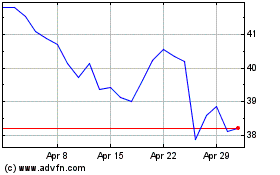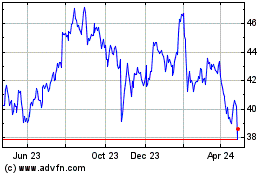By Shalini Ramachandran and Cassandra Jaramillo
Despite fears of cord-cutting and competition from cheaper
streaming options, Comcast Corp. said it lost fewer video customers
in the second quarter and reported higher revenue from its
NBCUniversal cable channels and broadcast networks.
But that doesn't mean the cable giant is resting easy. On the
company's earnings call Wednesday, NBCUniversal Chief Executive
Steve Burke said that media giants, including NBCU, may seek to
cull their smaller cable channels in favor of marquee channels as
pressure grows in the pay-TV world.
"I think you'll see more of that with us and others as the
discussions with [pay-TV providers] get more and more contentious,"
Mr. Burke said. NBCUniversal will continue to "invest in the big
guys," such as the USA cable channel and NBC broadcast network, and
"try to trim some of the smaller ones."
"There's just too many channels and people are spending too much
programming channels that are not fully distributed" across
American pay-TV homes, Mr. Burke said.
He noted that NBCUniversal has already repurposed some of its
"marginal" channels like G4 and Style over the past few years.
"We've done some; I think there's more to do," he said.
Media companies long helped fuel their profits by using the
power of their popular channels to get wider carriage of many
smaller ones. Mr. Burke's comments suggest that those practices may
have to change due to tumult in the pay-TV business from
cord-cutting and cheaper streaming options.
His comments came as Comcast reported better-than-expected
financial results in the most recent quarter. Net income fell to
$2.03 billion, or 83 cents a share, compared with $2.14 billion, or
84 cents a share, a year ago, dragged down by a weaker performance
at the film studio without a major blockbuster release during the
period.
Revenue grew 2.8% to $19.27 billion. Both earnings and revenue
exceeded estimates from analysts. Comcast shares rose 1.2% to
$67.98 in midday trading Wednesday.
Comcast lost 4,000 video customers in the seasonally weak
second-quarter when many families move or customers cancel cable-TV
service during the summer months. It was an improvement from the
69,000 subscribers lost in the year-ago period and its best
second-quarter performance in a decade.
Cable companies are benefiting from investing more in their
cable-TV products and bundling them alongside fast broadband.
Comcast, in particular, is reaping rewards from rolling out its
next-generation X1 internet-connected set-top box and guide, which
the company has said increases the time customers spend watching TV
and makes them more likely to stick with Comcast. As of the second
quarter, 40% of customers now have X1 boxes.
Comcast also likely was helped by weakness at its rivals, as
AT&T focused on integrating DirecTV and Dish Network Corp.
faced blackouts amid carriage disputes, Wells Fargo analyst Marci
Ryvicker said in a research note earlier this month.
On the call, Comcast executives continued to say that despite
early success with the X1, they have no plans to roll out a
streaming TV service nationwide outside of their cable footprint.
Comcast CEO Brian Roberts said such "over the top" economic models
are "unproven to us" and "it's not clear that's the right strategy
for us."
Comcast executives struck an optimistic note about the Rio
Olympics, which kick off next week, despite some of the early
controversies and negative headlines about the Zika virus. Noting
that the company made $120 million in profit from the 2012 London
Olympics, NBCU's Mr. Burke said "we are going to make a lot more in
Rio."
Comcast's broadband and business services divisions reported
sales growth in the second quarter, boosting overall revenue at the
cable business. The cable unit, which accounts for the bulk of the
company's revenue, posted 6% sales growth to $12.44 billion.
Broadband revenue increased 8.6% to $3.37 billion, as the
company added 220,000 broadband customers in the quarter compared
with 180,000 a year earlier.
Video revenue grew 2.8% to $5.58 billion, while
business-services revenue jumped 17% to $1.36 billion. Voice
revenue fell 1.1% to $893 million.
At NBCUniversal, revenue fell 1.8% to $7.10 billion, as declines
in filmed entertainment offset growth at its television networks
and theme parks. Operating cash flow at NBCUniversal was relatively
flat at $1.69 billion.
Filmed entertainment posted a 40% drop in revenue and 87%
decline in operating cash flow as Universal Pictures lacked a major
blockbuster release in the second quarter. A year ago, the studio
had box-office hits including "Furious 7" and "Jurassic World."
Revenue grew 4.7% to $2.57 billion at the unit that includes
Comcast's cable TV channels, including Bravo, USA Network and Syfy,
and operating cash flow grew 8.3% to $944 million. Revenue at the
broadcast-TV segment, which includes the flagship NBC network,
increased 17% to $2.13 billion.
Revenue at NBCU's theme parks segment grew 47% to $1.14 billion,
thanks to the inclusion of Universal Studios Japan, which Comcast
bought control of last September, as well as Universal Studios
Hollywood's opening of the Wizarding World of Harry Potter.
Write to Shalini Ramachandran at shalini.ramachandran@wsj.com
and Cassandra Jaramillo at cassandra.jaramillo@wsj.com
(END) Dow Jones Newswires
July 27, 2016 12:59 ET (16:59 GMT)
Copyright (c) 2016 Dow Jones & Company, Inc.
Comcast (NASDAQ:CMCSA)
Historical Stock Chart
From Mar 2024 to Apr 2024

Comcast (NASDAQ:CMCSA)
Historical Stock Chart
From Apr 2023 to Apr 2024
